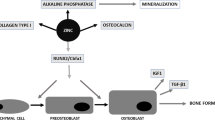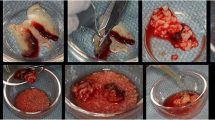Abstract
Stem cells from human exfoliated deciduous teeth (SHEDs) are a promising source for tissue engineering and stem cell transplantation. However, long-term in vitro culture and expansion lead to the loss of stemness of SHEDs, compromising their therapeutic benefits. Hypoxia plays an essential role in controlling the stem cell behavior of mesenchymal stem cells (MSCs). Thus, this study aimed to investigate the effects of cobalt chloride (CoCl2), a hypoxia-mimetic agent, on the stem cell marker expression and osteogenic differentiation of SHEDs. SHEDs were cultured with or without 50 or 100 μM CoCl2. Their proliferation, apoptosis, stem cell marker expression, migration ability, and osteogenic differentiation were examined. Culture with 50 and 100 μM CoCl2 increased the hypoxia-inducible factor-1 alpha (HIF-1α) protein levels in a dose-dependent manner in SHEDs without inducing significant cytotoxicity. This effect was accompanied by an increase in the proportion of STRO-1+ cells. CoCl2 significantly increased the expression of stem cell markers (OCT4, NANOG, SOX2, and c-Myc) in a dose-dependent manner. The migration ability was also promoted by CoCl2 treatment. Furthermore, SHEDs cultured in osteogenic medium with CoCl2 showed a dose-dependent reduction in alkaline phosphatase (ALP) activity and calcium deposition. The expression of osteogenic-related genes was also suppressed by CoCl2, especially in the 100-μM CoCl2 group. In conclusion, CoCl2 increased the expression of stem cell markers and inhibited the osteogenic differentiation of SHEDs. These findings may provide evidence supporting the use of in vitro hypoxic environments mimicked by CoCl2 in assisting the clinical application of SHEDs.






Similar content being viewed by others
References
Ahmed NE, Murakami M, Kaneko S, Nakashima M (2016) The effects of hypoxia on the stemness properties of human dental pulp stem cells (DPSCs). Sci Rep 6:35476. https://doi.org/10.1038/srep35476
Alarcon RM, Rupnow BA, Graeber TG, Knox SJ, Giaccia AJ (1996) Modulation of c-Myc activity and apoptosis in vivo. Cancer Res 56:4315–4319
Basu-Roy U, Ambrosetti D, Favaro R, Nicolis SK, Mansukhani A, Basilico C (2010) The transcription factor Sox2 is required for osteoblast self-renewal. Cell Death Differ 17:1345–1353
Berniakovich I, Giorgio M (2013) Low oxygen tension maintains multipotency, whereas normoxia increases differentiation of mouse bone marrow stromal cells. Int J Mol Sci 14:2119–2134. https://doi.org/10.3390/ijms14012119
Bork S, Pfister S, Witt H, Horn P, Korn B, Ho AD, Wagner W (2010) DNA methylation pattern changes upon long-term culture and aging of human mesenchymal stromal cells. Aging Cell 9:54–63. https://doi.org/10.1111/j.1474-9726.2009.00535.x
Boyette LB, Creasey OA, Guzik L, Lozito T, Tuan RS (2014) Human bone marrow-derived mesenchymal stem cells display enhanced clonogenicity but impaired differentiation with hypoxic preconditioning. Stem Cells Transl Med 3:241–254. https://doi.org/10.5966/sctm.2013-0079
Cencioni C, Capogrossi MC, Napolitano M (2012) The SDF-1/CXCR4 axis in stem cell preconditioning. Cardiovasc Res 94:400–407
Chow DC, Wenning LA, Miller WM, Papoutsakis ET (2001) Modeling pO(2) distributions in the bone marrow hematopoietic compartment. I. Krogh’s model. Biophys J 81:675–684. https://doi.org/10.1016/s0006-3495(01)75732-3
Cummins EP (2012) HIF-2 alpha - a mediator of stem cell altruism? Stem Cell Res Ther 3:52. https://doi.org/10.1186/scrt143
Fehrer C, Brunauer R, Laschober G, Unterluggauer H, Reitinger S, Kloss F, Gülly C, Gaßner R, Lepperdinger G (2007) Reduced oxygen tension attenuates differentiation capacity of human mesenchymal stem cells and prolongs their lifespan. Aging Cell 6:745–757. https://doi.org/10.1111/j.1474-9726.2007.00336.x
Grayson WL, Zhao F, Izadpanah R, Bunnell B, Ma T (2010) Effects of hypoxia on human mesenchymal stem cell expansion and plasticity in 3D constructs. J Cell Physiol 207:331–339
Greijer AE, van der Wall E (2004) The role of hypoxia inducible factor 1 (HIF-1) in hypoxia induced apoptosis. J Clin Pathol 57:1009–1014. https://doi.org/10.1136/jcp.2003.015032
Han S-M et al (2014) Enhanced proliferation and differentiation of Oct4-and Sox2-overexpressing human adipose tissue mesenchymal stem cells. Exp Mol Med 46. https://doi.org/10.1038/emm.2014.28
Hu C, Li L (2018) Preconditioning influences mesenchymal stem cell properties invitro and invivo. J Cell Mol Med 22:1428–1442. https://doi.org/10.1111/jcmm.13492
Huang GTJ, Gronthos S, Shi S (2009) Mesenchymal stem cells derived from dental tissues vs. those from other sources: their biology and role in regenerative medicine. J Dent Res 88:792–806. https://doi.org/10.1177/0022034509340867
Ji Z, Yang G, Shahzidi S, Tkacz-Stachowska K, Suo Z, Nesland JM, Peng Q (2006) Induction of hypoxia-inducible factor-1 alpha overexpression by cobalt chloride enhances cellular resistance to photodynamic therapy. Cancer Lett 244:182–189. https://doi.org/10.1016/j.canlet.2005.12.010
Kahn M (2014) Can we safely target the WNT pathway? Nat Rev Drug Discov 13:513–532
Kawashima N (2012) Characterisation of dental pulp stem cells: a new horizon for tissue regeneration? Arch Oral Biol 57:1439–1458. https://doi.org/10.1016/j.archoralbio.2012.08.010
Kim DS, Ko YJ, Lee MW, Park HJ, Park YJ, Kim DI, Sung KW, Koo HH, Yoo KH (2016) Effect of low oxygen tension on the biological characteristics of human bone marrow mesenchymal stem cells. Cell Stress Chaperones 21:1089–1099. https://doi.org/10.1007/s12192-016-0733-1
Koyam N, Okubo Y, Nakao K, Bessho K (2009) Evaluation of pluripotency in human dental pulp cells. J Oral Maxillofac Surg 67:501–506. https://doi.org/10.1016/j.joms.2008.09.011
Kyoko M et al (2009) Variation in the safety of induced pluripotent stem cell lines. Nat Biotechnol 27:743–745
Laksana K, Sooampon S, Pavasant P, Sriarj W (2017) Cobalt chloride enhances the stemness of human dental pulp cells. J Endod 43:760–765. https://doi.org/10.1016/j.joen.2017.01.005
Landor SKJ, Lendahl U (2017) The interplay between the cellular hypoxic response and notch signaling. Exp Cell Res 356:146–151. https://doi.org/10.1016/j.yexcr.2017.04.030
Li C-T, Liu J-X, Yu B, Liu R, Dong C, Li S-J (2016) Notch signaling represses hypoxia-inducible factor-1 alpha-induced activation of Wnt/beta-catenin signaling in osteoblasts under cobalt-mimicked hypoxia. Mol Med Rep 14:689–696. https://doi.org/10.3892/mmr.2016.5324
Li L, Jaiswal PK, Makhoul G, Jurakhan R, Selvasandran K, Ridwan K, Cecere R (2017) Hypoxia modulates cell migration and proliferation in placenta-derived mesenchymal stem cells. J Thoracic Cardiovasc Surg 154:543–552.e3
Liu L, Wei X, Huang R, Ling J, Wu L, Xiao Y (2013) Effect of bone morphogenetic protein-4 on the expression of Sox2, Oct-4, and c-Myc in human periodontal ligament cells during long-term culture. Stem Cells Dev 22:1670–1677. https://doi.org/10.1089/scd.2012.0548
López-Iglesias P, Alcaina Y, Tapia N, Sabour D, Arauzo-Bravo MJ, Sainz de la Maza D, Berra E, O’Mara AN, Nistal M, Ortega S, Donovan PJ, Schöler HR, de Miguel MP (2015) Hypoxia induces pluripotency in primordial germ cells by HIF1α stabilization and Oct4 deregulation. Antioxid Redox Signal 22:205–223
Miura M, Gronthos S, Zhao MR, Lu B, Fisher LW, Robey PG, Shi ST (2003) SHED: stem cells from human exfoliated deciduous teeth. Proc Natl Acad Sci U S A 100:5807–5812. https://doi.org/10.1073/pnas.0937635100
Mohyeldin A, Garzon-Muvdi T, Quinones-Hinojosa A (2010) Oxygen in stem cell biology: a critical component of the stem cell niche. Cell Stem Cell 7:150–161. https://doi.org/10.1016/j.stem.2010.07.007
Moore KA, Lemischka IR (2006) Stem cells and their niches. Science 311:1880–1885. https://doi.org/10.1126/science.1110542
Nombela-Arrieta C, Silberstein LE (2014) The science behind the hypoxic niche of hematopoietic stem and progenitors. Hematology Am Soc Hematol Educ Program 2014:542–547. https://doi.org/10.1182/asheducation-2014.1.542
Osathanon T, Vivatbutsiri P, Sukarawan W, Sriarj W, Pavasant P, Sooampon S (2015) Cobalt chloride supplementation induces stem-cell marker expression and inhibits osteoblastic differentiation in human periodontal ligament cells. Arch Oral Biol 60:29–36. https://doi.org/10.1016/j.archoralbio.2014.08.018
Rombouts C, Giraud T, Jeanneau C, About I (2017) Pulp vascularization during tooth development, regeneration, and therapy. J Dent Res 96:137–144. https://doi.org/10.1177/0022034516671688
Rosa V, Dubey N, Islam I, Min KS, Nor JE (2016) Pluripotency of stem cells from human exfoliated deciduous teeth for tissue engineering. Stem Cells Int 2016:5957806–5957806. https://doi.org/10.1155/2016/5957806
Sakdee JB, White RR, Pagonis TC, Hauschka PV (2009) Hypoxia-amplified proliferation of human dental pulp cells. J Endod 35:818–823. https://doi.org/10.1016/j.joen.2009.03.001
Semenza GL (2012) Hypoxia-inducible factors in physiology and medicine. Cell 148:399–408. https://doi.org/10.1016/j.cell.2012.01.021
Sheehy EJ, Buckley CT, Kelly DJ (2012) Oxygen tension regulates the osteogenic, chondrogenic and-endochondral phenotype of bone marrow derived mesenchymal stem cells. Biochem Biophys Res Commun 417:305–310. https://doi.org/10.1016/j.bbrc.2011.11.105
Slape CI, Jesslyn S, Jowett JBM, Aplan PD, Andreas S, Jane SM, Curtis DJ (2012) Inhibition of apoptosis by BCL2 prevents leukemic transformation of a murine myelodysplastic syndrome. Blood 120:2475–2483
Sloan A, Waddington R (2010) Dental pulp stem cells: what, where, how? Int J Paediatr Dent 19:61–70
Teti G, Focaroli S, Salvatore V, Mazzotti E, Ingra’ L, Mazzotti A, Falconi M (2018) The hypoxia-mimetic agent cobalt chloride differently affects human mesenchymal stem cells in their chondrogenic potential. Stem Cells Int 2018(2018-3-13):2018
Tsai C-C, Su P-F, Huang Y-F, Yew T-L, Hung S-C (2012) Oct4 and Nanog directly regulate Dnmt1 to maintain self-renewal and undifferentiated state in mesenchymal stem cells. Mol Cell 47:169–182. https://doi.org/10.1016/j.molcel.2012.06.020
Wang X, Wu TT, Jiang L, Rong D, Zhu YQ (2017) Deferoxamine-induced migration and odontoblast differentiation via ROS-dependent autophagy in dental pulp stem cells. Cell Physiol Biochem 43:2535–2547. https://doi.org/10.1159/000484506
Werle SB, Chagastelles P, Pranke P, Casagrande L (2016) The effects of hypoxia on in vitro culture of dental-derived stem cells. Arch Oral Biol 68:13–20. https://doi.org/10.1016/j.archoralbio.2016.03.011
Werle SB, Chagastelles P, Pranke P, Casagrande L (2018) Hypoxia upregulates the expression of the pluripotency markers in the stem cells from human deciduous teeth. Clin Oral Investig 23:199–207. https://doi.org/10.1007/s00784-018-2427-9
Xuechao Y, X Frank W, van den Beucken JJJP, Zhuan B, Mingwen F, Jansen JA (2009) Hard tissue formation of STRO-1-selected rat dental pulp stem cells in vivo. Tissue Eng A 15:367
Yang X, Zhang W, Van dDJ, Walboomers XF, Bian Z, Fan M, Jansen JA (2007) Multilineage potential of STRO-1+ rat dental pulp cells in vitro. J Tissue Eng Regen Med 1:128–135
Yu CY, Boyd NM, Cringle SJ, Alder VA, Yu DY (2002) Oxygen distribution and consumption in rat lower incisor pulp. Arch Oral Biol 47:529–536
Yu Y, Bi CS, Wu RX, Yin Y, Zhang XY, Lan PH, Chen FM (2016) Effects of short-term inflammatory and/or hypoxic pretreatments on periodontal ligament stem cells: in vitro and in vivo studies. Cell Tissue Res 366:311–328. https://doi.org/10.1007/s00441-016-2437-3
Yu X, Wan Q, Cheng G, Cheng X, Zhang J, Pathak JL, Li Z (2018) CoCl2 , a mimic of hypoxia, enhances bone marrow mesenchymal stem cells migration and osteogenic differentiation via STAT3 signaling pathway. Cell Biol Int 42:1321–1329. https://doi.org/10.1002/cbin.11017
Zhang P, Ha N, Dai Q, Zhou S, Yu C, Jiang L (2017) Hypoxia suppresses osteogenesis of bone mesenchymal stem cells via the extracellular signal-regulated 1/2 and p38-mitogen activated protein kinase signaling pathways. Mol Med Rep 16:5515–5522. https://doi.org/10.3892/mmr.2017.7276
Zhao L, Liu X, Zhang Y, Liang X, Ding Y, Xu Y, Fang Z, Zhang F (2016) Enhanced cell survival and paracrine effects of mesenchymal stem cells overexpressing hepatocyte growth factor promote cardioprotection in myocardial infarction. Exp Cell Res 344:30–39. https://doi.org/10.1016/j.yexcr.2016.03.024
Zhao D, Liu L, Chen Q, Wang F, Li Q, Zeng Q, Huang J, Luo M, Li W, Zheng Y, Liu T (2018) Hypoxia with Wharton’s jelly mesenchyma stem cell coculture maintains stemness of umbilical cord blood-derived CD34(+) cells. Stem Cell Res Ther 9:158. https://doi.org/10.1186/s13287-018-0902-5
Acknowledgements
We are grateful to the healthy donors for participating in this study.
Funding
This work was supported by the National Natural Science Foundation of China (No. 81472526 and No. 81873711), the Natural Science Foundation of Guangdong Province (No. 2014A030313126), and the Guangdong Science and Technology Project (No. 2016A020215094 and No. 2016A020216007).
Author information
Authors and Affiliations
Corresponding authors
Ethics declarations
The entire study was approved by the Ethics Committee of Sun Yat-sen University. All individuals who participated in this study provided informed consent.
Conflict of interest
The authors declare that they have no conflict of interest.
Additional information
Publisher’s note
Springer Nature remains neutral with regard to jurisdictional claims in published maps and institutional affiliations.
Rights and permissions
About this article
Cite this article
Chen, Y., Zhao, Q., Yang, X. et al. Effects of cobalt chloride on the stem cell marker expression and osteogenic differentiation of stem cells from human exfoliated deciduous teeth. Cell Stress and Chaperones 24, 527–538 (2019). https://doi.org/10.1007/s12192-019-00981-5
Received:
Revised:
Accepted:
Published:
Issue Date:
DOI: https://doi.org/10.1007/s12192-019-00981-5




